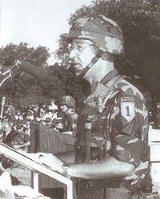
Bruce Bennett Gorham Clarke
Encyclopedia
Bruce Bennett Gorham Clarke (born January 26, 1943, Ft. Benning, Georgia) is a former U.S. Army officer. Clarke is currently president of Bruce Clarke Consultants, Inc., a defense consulting firm. He is widely published on military and national security affairs including Expendable Warriors and a regular column for the Examiner.
and Corrine "Colonel" Bennett Gorham (later Clarke). After LTC Gorham was killed leading paratroopers from the 505th Parachute Infantry Regiment
during Operation Husky, the allied invasion of Sicily
during World War II
, Clarke's mother married Edwin R. Clarke who adopted Clarke. Clarke's siblings are Dr. Richard Clarke and Cindy Clarke Carnahan.
Clarke married his wife Sue in 1969 after the two had met on a blind date during a golf tournament upon his return from Vietnam. While a graduate student at UCLA, the Clarkes appeared on the Newlywed Game winning a bedroom set. The Clarkes have three children, a daughter and two sons, and three grandsons.
in Concord, Massachusetts. Excelling both as a student and as an athlete, Clarke was accepted to both Stanford and Harvard but, to the surprise of many of his Ivy League
-bound classmates, elected to attend the U.S. Military Academy at West Point.
In 1961, Clarke joined the Class of 1965 at West Point. While at West Point, Clarke was known for overloading on political science courses. He graduated third in his class in military history. Upon graduation in June 1965, Clarke received a commission as a second lieutenant in the cavalry.
Clarke holds a master of arts degree from the University of California, Los Angeles
. He is a graduate of the Command and General Staff College
and the National War College
. Clarke was a member of MIT's Center for International Studies' Seminar II.
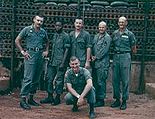 Following Ranger
Following Ranger
and Airborne Schools, Clarke commanded a 160-man airborne cavalry troop in Germany. From there he deployed to Vietnam first as an assistant district advisor and then as a district advisor. Clarke fought in the Battle of Khe Sanh
and later participated in both the planning and retaking of the combat base. In 2007, Clarke wrote about his experiences in Expendable Warriors from Praeger Security International.
Returning from Vietnam, and recently married, Clarke moved to Los Angeles to attend the University of California, Los Angeles where he earned a master of arts degree. Because of a shortage of officers, Clarke was forced to leave UCLA before finishing his PhD for a teaching post in the Department of Social Sciences at West Point. Among his students at West Point was David H. Petraeus. Clarke next attended the Command and General Staff College at Ft. Leavenworth, Kansas and then moved up through a variety of positions within the 1st Infantry Division at Ft. Riley, Kansas.
In 1979, Clarke was tapped to join the Army Staff in the Office of the Deputy Chief of Staff for Operations and Plans in the Political-Military Division under future Joint Chiefs of Staff
Chairman General John Shalikashvili. One of his first assignments was as a member of the Reagan-Carter presidential transition team. Clarke also worked on the ABM Treaty
. In early 1982, he left the Pentagon to take command of the 2nd Squadron, 11th Armored Cavalry Regiment in Bad Kissingen
, Germany
. Clarke and his troopers were responsible for over 150-km of the East-West German border in the Fulda Gap. During this period, the Squadron fielded both the M1 Abrams
main battle tank and the M2 Bradley
fighting vehicle.
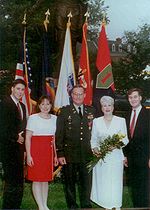 Next, Clarke attended the National War College
Next, Clarke attended the National War College
graduating with the class of 1985. From there he joined the Arms Control and Disarmament Agency
inside the State Department
working for Ambassador Ken Adelman. Clarke served as the senior military officer in arms control negotiations with the Soviet Union
. After his first year at the State Department he was selected for brigade command but the busy pace of Soviet-American negotiations caused his assignment to be extended one year beyond the normal two year posting. In his three years at the State Department, he regularly shuttled between negotiations in Washington and Geneva
. This period include three summit meetings between President Ronald Reagan
and Soviet premier Mikhail Gorbachev
: the November 1985 Geneva Summit, the October 1986 Reykjavík Summit
and the December 1987 Washington summit where the Intermediate-Range Nuclear Forces Treaty
was signed.
In 1988, Clarke returned to the uniformed Army as commander of the 2nd Brigade, 1st Infantry Division at Ft. Riley, Kansas. The brigade was composed of 2-16 Infantry Battalion, 3-37 Armor Battalion, and 4-37 Armor Battalion, plus supporting units and a battalion from the Minnesota National Guard. Clarke's training of the Dagger Brigade for desert combat would prove fortuitous as days after giving up command in 1990 to Colonel Tony Moreno, Iraqi forces overran Kuwait. The 2nd Brigade eventually helped lead the ground invasion during Operation Desert Storm capturing Safwan
, the site of the cease fire talks between General Norman Schwarzkopf and Iraqi commanders. In recognition of his service to the armor community, in 1990 Clarke was inducted into the Order of Saint George
, one of the U.S. Armor Association's highest honors. That same year, Kansas Governor Mike Hayden
named Clarke an "honorary Kansan" apparently unaware that Clarke was a lifelong Kansan.
Clarke's final posting was as Director of National Security Studies at the U.S. Army War College
in Carlisle, Pennsylvania
. While at the Army War College he published extensively on military modernization and helped shape the work on conflict termination studies. In late-1992 this work was put to the test when, following President George H. W. Bush
's deployment of forces to Somalia
for Operation Restore Hope, Clarke led a team to consult with the Joint Chiefs of Staff
on building an exit strategy. The military and political bureaucracies rejected their advice and failed to establish a coherent policy to guide the withdrawal of forces. The U.S. was further drawn into the conflict before President Bill Clinton
pulled troops out after the Battle of Mogadishu
and the Blackhawk down incident. Clinton and his Secretary of Defense Leslie Aspin were roundly criticized for also failing to establish an exit strategy. For his work at the Army War College, Clarke was awarded the General Dwight D. Eisenhower
Chair in National Security in 1994. In 1995, following 30-years on active duty, Clarke retired. Army Chief of Staff General Gordon R. Sullivan
presided over the ceremony and awarded Clarke the Legion of Merit.
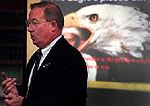 Following his retirement from the Army, Clarke was the Training Manager at the Royal Saudi Land Forces Armored Institute in Tabuk, Saudi Arabia
Following his retirement from the Army, Clarke was the Training Manager at the Royal Saudi Land Forces Armored Institute in Tabuk, Saudi Arabia
training Saudi armor officers and soldiers on the M1A2 main battle tank
. After the Gulf War, the Saudis purchased 315 M1 tanks, enough to outfit a full armored division (or two mechanized infantry divisions). In 1998 Clarke returned to the U.S. and joined QuVis, a start-up technology company, where he helped them develop their military and government business.
In 2000, Clarke founded Bruce Clarke Consultants, Inc. to work with defense contractors on technology integration issues. Since 2005 he has also served as an advisor to Rockhill Partners
, a venture capital partnership. His work on defense issues, national security strategy and knowledge of the Middle East has led to his advising at least two members of the U.S. Senate. He also drew upon his experience during the Carter-Reagan presidential transition as a paid advisor to incoming Kansas Governor Bill Graves
.
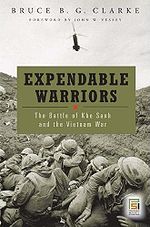 Clarke is the author of Expendable Warriors (Praeger Security International, 2007) with a foreword by former Joint Chiefs Chairman General John Vessey. The book is set to be released in paperback in April 2009 by Stackpole Books. He is also the author of Conflict Termination: A Rational Model (Strategic Studies Institute, U.S. Army War College, 1992). He was a contributor to Managing Contemporary Conflict: Pillars of Success edited by Max G. Manwaring and William J. Olson (Westview Press, 1996) and Maneuver Warfare Anthology, edited by Richard D. Hooker, Jr. (The Presidio Press, 1993).
Clarke is the author of Expendable Warriors (Praeger Security International, 2007) with a foreword by former Joint Chiefs Chairman General John Vessey. The book is set to be released in paperback in April 2009 by Stackpole Books. He is also the author of Conflict Termination: A Rational Model (Strategic Studies Institute, U.S. Army War College, 1992). He was a contributor to Managing Contemporary Conflict: Pillars of Success edited by Max G. Manwaring and William J. Olson (Westview Press, 1996) and Maneuver Warfare Anthology, edited by Richard D. Hooker, Jr. (The Presidio Press, 1993).
In addition to a regular column for the Examiner he began writing in July 2009, Clarke has authored numerous publications for military audiences having been published in the Army Times, Armor, the Joint Forces Journal, Military Review, Infantry, Field Artillery and the Journal of Conflict and Terrorism. Clarke has also been published in the Washington Post, the Baltimore Sun, and The Topeka Capital-Journal
.
Family
Clarke was born in Ft. Benning, Georgia to LTC Arthur F. GorhamArthur F. Gorham
Arthur Fulbrook Gorham was a U.S. Army officer and Paratrooper. Gorham was the first commander of the 1st Battalion, 505th Parachute Infantry Regiment of the 82nd Airborne Division...
and Corrine "Colonel" Bennett Gorham (later Clarke). After LTC Gorham was killed leading paratroopers from the 505th Parachute Infantry Regiment
505th Parachute Infantry Regiment
The 505th Parachute Infantry Regiment is one of four infantry regiments of the 82nd Airborne Division of the United States Army.Activated in 1942, the regiment participated in the campaigns of Sicily, Salerno, Normandy, Holland and the Battle of the Bulge during World War II...
during Operation Husky, the allied invasion of Sicily
Sicily
Sicily is a region of Italy, and is the largest island in the Mediterranean Sea. Along with the surrounding minor islands, it constitutes an autonomous region of Italy, the Regione Autonoma Siciliana Sicily has a rich and unique culture, especially with regard to the arts, music, literature,...
during World War II
World War II
World War II, or the Second World War , was a global conflict lasting from 1939 to 1945, involving most of the world's nations—including all of the great powers—eventually forming two opposing military alliances: the Allies and the Axis...
, Clarke's mother married Edwin R. Clarke who adopted Clarke. Clarke's siblings are Dr. Richard Clarke and Cindy Clarke Carnahan.
Clarke married his wife Sue in 1969 after the two had met on a blind date during a golf tournament upon his return from Vietnam. While a graduate student at UCLA, the Clarkes appeared on the Newlywed Game winning a bedroom set. The Clarkes have three children, a daughter and two sons, and three grandsons.
Education
Clarke attended public schools in Wichita, Kansas before winning a scholarship to the Middlesex SchoolMiddlesex School
Middlesex School is an independent secondary school for grades 9 - 12 located in Concord, Massachusetts. It was founded in 1901 by a Roxbury Latin School alumnus, Frederick Winsor, who headed the school until 1937. Winsor set up a National Scholarship Program for the school, the first of its kind...
in Concord, Massachusetts. Excelling both as a student and as an athlete, Clarke was accepted to both Stanford and Harvard but, to the surprise of many of his Ivy League
Ivy League
The Ivy League is an athletic conference comprising eight private institutions of higher education in the Northeastern United States. The conference name is also commonly used to refer to those eight schools as a group...
-bound classmates, elected to attend the U.S. Military Academy at West Point.
In 1961, Clarke joined the Class of 1965 at West Point. While at West Point, Clarke was known for overloading on political science courses. He graduated third in his class in military history. Upon graduation in June 1965, Clarke received a commission as a second lieutenant in the cavalry.
Clarke holds a master of arts degree from the University of California, Los Angeles
University of California, Los Angeles
The University of California, Los Angeles is a public research university located in the Westwood neighborhood of Los Angeles, California, USA. It was founded in 1919 as the "Southern Branch" of the University of California and is the second oldest of the ten campuses...
. He is a graduate of the Command and General Staff College
Command and General Staff College
The United States Army Command and General Staff College at Fort Leavenworth, Kansas is a graduate school for United States Army and sister service officers, interagency representatives, and international military officers. The college was established in 1881 by William Tecumseh Sherman as a...
and the National War College
National War College
The National War College of the United States is a school in the National Defense University. It is housed in Roosevelt Hall on Fort Lesley J. McNair, Washington, D.C., the third-oldest Army post still active. It was officially established on July 1, 1946, as an upgraded replacement for the...
. Clarke was a member of MIT's Center for International Studies' Seminar II.
Army career

United States Army Rangers
United States Army Rangers are elite members of the United States Army. Rangers have served in recognized U.S. Army Ranger units or have graduated from the U.S. Army's Ranger School...
and Airborne Schools, Clarke commanded a 160-man airborne cavalry troop in Germany. From there he deployed to Vietnam first as an assistant district advisor and then as a district advisor. Clarke fought in the Battle of Khe Sanh
Khe Sanh
Khe Sanh is the district capital of Hướng Hoá District, Quảng Trị Province, Vietnam, located 63 km west of Đông Hà.Khe Sanh Combat Base was a United States Marine Corps outpost in South Vietnam used during the Vietnam War. The airstrip was built in September 1962...
and later participated in both the planning and retaking of the combat base. In 2007, Clarke wrote about his experiences in Expendable Warriors from Praeger Security International.
Returning from Vietnam, and recently married, Clarke moved to Los Angeles to attend the University of California, Los Angeles where he earned a master of arts degree. Because of a shortage of officers, Clarke was forced to leave UCLA before finishing his PhD for a teaching post in the Department of Social Sciences at West Point. Among his students at West Point was David H. Petraeus. Clarke next attended the Command and General Staff College at Ft. Leavenworth, Kansas and then moved up through a variety of positions within the 1st Infantry Division at Ft. Riley, Kansas.
In 1979, Clarke was tapped to join the Army Staff in the Office of the Deputy Chief of Staff for Operations and Plans in the Political-Military Division under future Joint Chiefs of Staff
Joint Chiefs of Staff
The Joint Chiefs of Staff is a body of senior uniformed leaders in the United States Department of Defense who advise the Secretary of Defense, the Homeland Security Council, the National Security Council and the President on military matters...
Chairman General John Shalikashvili. One of his first assignments was as a member of the Reagan-Carter presidential transition team. Clarke also worked on the ABM Treaty
Anti-Ballistic Missile Treaty
The Anti-Ballistic Missile Treaty was a treaty between the United States and the Soviet Union on the limitation of the anti-ballistic missile systems used in defending areas against missile-delivered nuclear weapons....
. In early 1982, he left the Pentagon to take command of the 2nd Squadron, 11th Armored Cavalry Regiment in Bad Kissingen
Bad Kissingen
Bad Kissingen is a spa town in the Bavarian region of Lower Franconia and is the seat of the district Bad Kissingen. Situated to the south of the Rhön Mountains on the Franconian Saale river, it is a world-famous health resort.- Town structure :...
, Germany
Germany
Germany , officially the Federal Republic of Germany , is a federal parliamentary republic in Europe. The country consists of 16 states while the capital and largest city is Berlin. Germany covers an area of 357,021 km2 and has a largely temperate seasonal climate...
. Clarke and his troopers were responsible for over 150-km of the East-West German border in the Fulda Gap. During this period, the Squadron fielded both the M1 Abrams
M1 Abrams
The M1 Abrams is a third-generation main battle tank produced in the United States. It is named after General Creighton Abrams, former Army Chief of Staff and Commander of US military forces in Vietnam from 1968 to 1972. The M1 is a well armed, heavily armored, and highly mobile tank designed for...
main battle tank and the M2 Bradley
M2 Bradley
The Bradley Fighting Vehicle is an American fighting vehicle platform manufactured by BAE Systems Land and Armaments, formerly United Defense.As with other infantry fighting vehicles, the Bradley is designed to transport infantry with armor protection while providing covering fire to suppress enemy...
fighting vehicle.

National War College
The National War College of the United States is a school in the National Defense University. It is housed in Roosevelt Hall on Fort Lesley J. McNair, Washington, D.C., the third-oldest Army post still active. It was officially established on July 1, 1946, as an upgraded replacement for the...
graduating with the class of 1985. From there he joined the Arms Control and Disarmament Agency
Arms Control and Disarmament Agency
The U.S. Arms Control and Disarmament Agency was established as an independent agency of the United States government by the Arms Control and Disarmament Act , September 26, 1961, a bill drafted by presidential adviser John J. McCloy. Its predecessor was the U.S. Disarmament Administration, part...
inside the State Department
United States Department of State
The United States Department of State , is the United States federal executive department responsible for international relations of the United States, equivalent to the foreign ministries of other countries...
working for Ambassador Ken Adelman. Clarke served as the senior military officer in arms control negotiations with the Soviet Union
Soviet Union
The Soviet Union , officially the Union of Soviet Socialist Republics , was a constitutionally socialist state that existed in Eurasia between 1922 and 1991....
. After his first year at the State Department he was selected for brigade command but the busy pace of Soviet-American negotiations caused his assignment to be extended one year beyond the normal two year posting. In his three years at the State Department, he regularly shuttled between negotiations in Washington and Geneva
Geneva
Geneva In the national languages of Switzerland the city is known as Genf , Ginevra and Genevra is the second-most-populous city in Switzerland and is the most populous city of Romandie, the French-speaking part of Switzerland...
. This period include three summit meetings between President Ronald Reagan
Ronald Reagan
Ronald Wilson Reagan was the 40th President of the United States , the 33rd Governor of California and, prior to that, a radio, film and television actor....
and Soviet premier Mikhail Gorbachev
Mikhail Gorbachev
Mikhail Sergeyevich Gorbachev is a former Soviet statesman, having served as General Secretary of the Communist Party of the Soviet Union from 1985 until 1991, and as the last head of state of the USSR, having served from 1988 until its dissolution in 1991...
: the November 1985 Geneva Summit, the October 1986 Reykjavík Summit
Reykjavik Summit
The Reykjavík Summit was a summit meeting between U.S. president Ronald Reagan and Secretary-General of the Communist Party of the Soviet Union Mikhail Gorbachev, held in the famous house of Höfði in Reykjavík, the capital city of Iceland, on October 11–12, 1986...
and the December 1987 Washington summit where the Intermediate-Range Nuclear Forces Treaty
Intermediate-Range Nuclear Forces Treaty
The Intermediate-Range Nuclear Forces Treaty is a 1987 agreement between the United States and the Soviet Union. Signed in Washington, D.C. by U.S. President Ronald Reagan and General Secretary Mikhail Gorbachev on December 8, 1987, it was ratified by the United States Senate on May 27, 1988 and...
was signed.
In 1988, Clarke returned to the uniformed Army as commander of the 2nd Brigade, 1st Infantry Division at Ft. Riley, Kansas. The brigade was composed of 2-16 Infantry Battalion, 3-37 Armor Battalion, and 4-37 Armor Battalion, plus supporting units and a battalion from the Minnesota National Guard. Clarke's training of the Dagger Brigade for desert combat would prove fortuitous as days after giving up command in 1990 to Colonel Tony Moreno, Iraqi forces overran Kuwait. The 2nd Brigade eventually helped lead the ground invasion during Operation Desert Storm capturing Safwan
Safwan
Safwan is a town in southeast Iraq on the border with Kuwait. It was the site of an Iraqi Air Force base.-Gulf War:Safwan is located in the south of Iraq at Iraqi Kuwaiti border , along the infamous Highway of Death from the Gulf War of 1991. The cease-fire negotiations between Gen...
, the site of the cease fire talks between General Norman Schwarzkopf and Iraqi commanders. In recognition of his service to the armor community, in 1990 Clarke was inducted into the Order of Saint George
Saint George Award
The Saint George Award, formally the Order of Saint George Medallion, is the top award given to members of the Army's mounted force by the United States Armor Association of the United States Army...
, one of the U.S. Armor Association's highest honors. That same year, Kansas Governor Mike Hayden
Mike Hayden
John Michael Hayden, was the 41st Governor of Kansas. He subsequently served as Secretary of the Kansas Wildlife and Parks Department under governors Kathleen Sebelius and Mark Parkinson.-Early life:...
named Clarke an "honorary Kansan" apparently unaware that Clarke was a lifelong Kansan.
Clarke's final posting was as Director of National Security Studies at the U.S. Army War College
U.S. Army War College
The United States Army War College is a United States Army school located in Carlisle, Pennsylvania, on the 500 acre campus of the historic Carlisle Barracks...
in Carlisle, Pennsylvania
Carlisle, Pennsylvania
Carlisle is a borough in and the county seat of Cumberland County, Pennsylvania, United States. The name is traditionally pronounced with emphasis on the second syllable. Carlisle is located within the Cumberland Valley, a highly productive agricultural region. As of the 2010 census, the borough...
. While at the Army War College he published extensively on military modernization and helped shape the work on conflict termination studies. In late-1992 this work was put to the test when, following President George H. W. Bush
George H. W. Bush
George Herbert Walker Bush is an American politician who served as the 41st President of the United States . He had previously served as the 43rd Vice President of the United States , a congressman, an ambassador, and Director of Central Intelligence.Bush was born in Milton, Massachusetts, to...
's deployment of forces to Somalia
Somalia
Somalia , officially the Somali Republic and formerly known as the Somali Democratic Republic under Socialist rule, is a country located in the Horn of Africa. Since the outbreak of the Somali Civil War in 1991 there has been no central government control over most of the country's territory...
for Operation Restore Hope, Clarke led a team to consult with the Joint Chiefs of Staff
Joint Chiefs of Staff
The Joint Chiefs of Staff is a body of senior uniformed leaders in the United States Department of Defense who advise the Secretary of Defense, the Homeland Security Council, the National Security Council and the President on military matters...
on building an exit strategy. The military and political bureaucracies rejected their advice and failed to establish a coherent policy to guide the withdrawal of forces. The U.S. was further drawn into the conflict before President Bill Clinton
Bill Clinton
William Jefferson "Bill" Clinton is an American politician who served as the 42nd President of the United States from 1993 to 2001. Inaugurated at age 46, he was the third-youngest president. He took office at the end of the Cold War, and was the first president of the baby boomer generation...
pulled troops out after the Battle of Mogadishu
Battle of Mogadishu
The Battle of Mogadishu or for Somalis: the Day of the Rangers was part of Operation Gothic Serpent and was fought on October 3 and 4, 1993, in Mogadishu, Somalia, between forces of the United States supported by UNOSOM II and Somali militia fighters loyal to the self-proclaimed president-to-be...
and the Blackhawk down incident. Clinton and his Secretary of Defense Leslie Aspin were roundly criticized for also failing to establish an exit strategy. For his work at the Army War College, Clarke was awarded the General Dwight D. Eisenhower
Dwight D. Eisenhower
Dwight David "Ike" Eisenhower was the 34th President of the United States, from 1953 until 1961. He was a five-star general in the United States Army...
Chair in National Security in 1994. In 1995, following 30-years on active duty, Clarke retired. Army Chief of Staff General Gordon R. Sullivan
Gordon R. Sullivan
General Gordon Russell Sullivan is a retired Army general officer, who served as the 32nd Chief of Staff of the United States Army and as a member of the Joint Chiefs of Staff.-Background and education:...
presided over the ceremony and awarded Clarke the Legion of Merit.
Post-Army career

Saudi Arabia
The Kingdom of Saudi Arabia , commonly known in British English as Saudi Arabia and in Arabic as as-Sa‘ūdiyyah , is the largest state in Western Asia by land area, constituting the bulk of the Arabian Peninsula, and the second-largest in the Arab World...
training Saudi armor officers and soldiers on the M1A2 main battle tank
M1 Abrams
The M1 Abrams is a third-generation main battle tank produced in the United States. It is named after General Creighton Abrams, former Army Chief of Staff and Commander of US military forces in Vietnam from 1968 to 1972. The M1 is a well armed, heavily armored, and highly mobile tank designed for...
. After the Gulf War, the Saudis purchased 315 M1 tanks, enough to outfit a full armored division (or two mechanized infantry divisions). In 1998 Clarke returned to the U.S. and joined QuVis, a start-up technology company, where he helped them develop their military and government business.
In 2000, Clarke founded Bruce Clarke Consultants, Inc. to work with defense contractors on technology integration issues. Since 2005 he has also served as an advisor to Rockhill Partners
Rockhill Partners
Rockhill Partners is an early-stage venture capital partnership. The firm invests in companies in the life science and technology sectors throughout the U.S. Current investments include Proteon Therapeutics, Orbis Biosciences and Infegy....
, a venture capital partnership. His work on defense issues, national security strategy and knowledge of the Middle East has led to his advising at least two members of the U.S. Senate. He also drew upon his experience during the Carter-Reagan presidential transition as a paid advisor to incoming Kansas Governor Bill Graves
Bill Graves
William Preston "Bill" Graves , was the 43rd Governor of Kansas from 1995 until 2003.Graves was born in Salina, Kansas in 1953 to parents who owned a trucking firm...
.
Publications

In addition to a regular column for the Examiner he began writing in July 2009, Clarke has authored numerous publications for military audiences having been published in the Army Times, Armor, the Joint Forces Journal, Military Review, Infantry, Field Artillery and the Journal of Conflict and Terrorism. Clarke has also been published in the Washington Post, the Baltimore Sun, and The Topeka Capital-Journal
The Topeka Capital-Journal
The Topeka Capital-Journal is a daily newspaper in Topeka, Kansas owned by Morris Communications. It has won one Pulitzer Prize.-History:...
.

